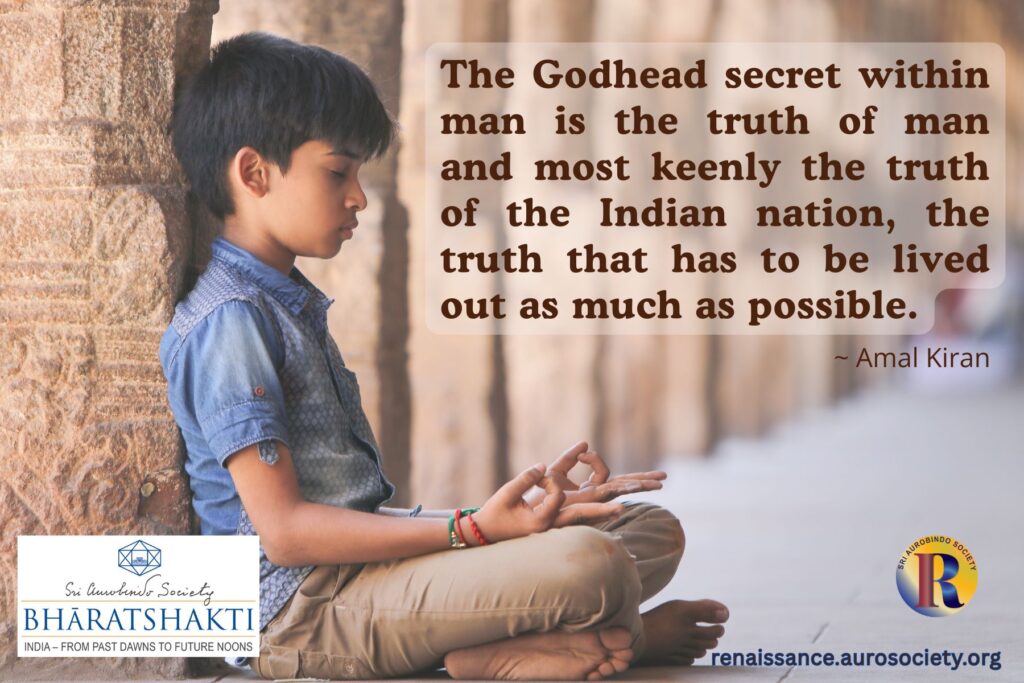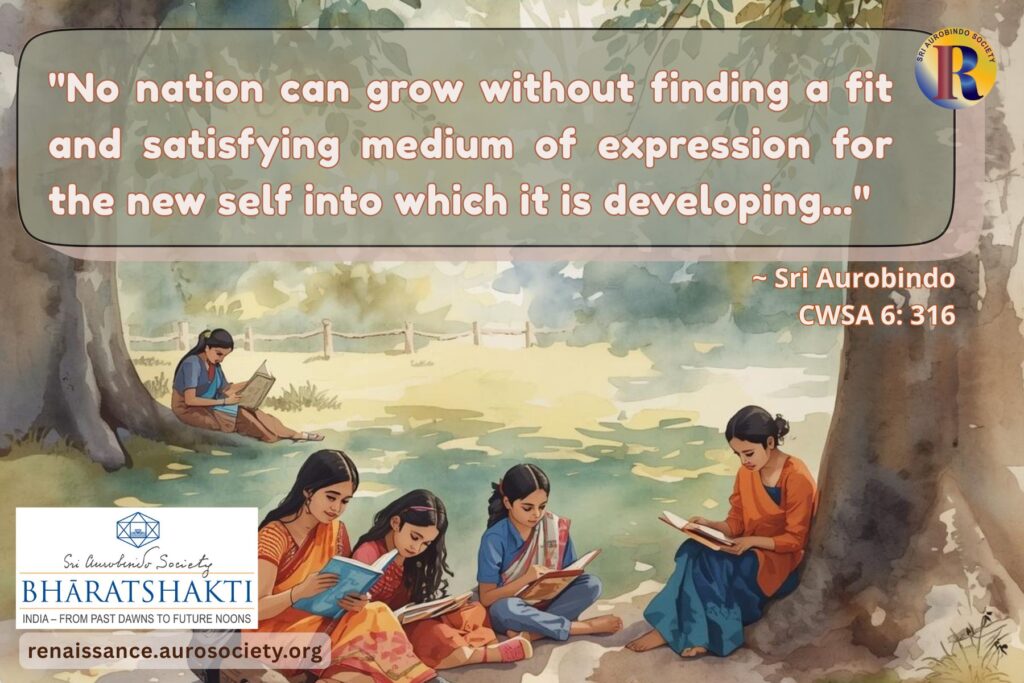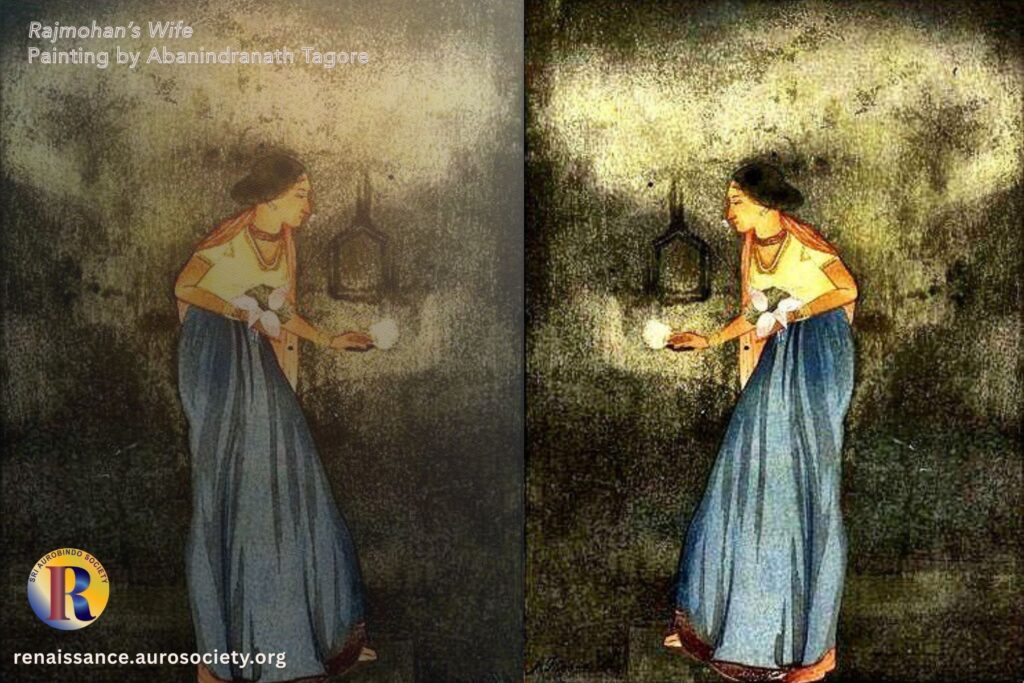Editor’s note: The author brings together some practical advice from the works of Sri Aurobindo and the Mother on how to develop greater concentration and focus. She reminds us of the immense significance of our growing capacity of concentrated attention in our overall well-being.

The source of all successful activity is concentrated attention, says the Mother. The average person wastes a considerable amount of mental energy. This leads to making frequent mistakes. On the other hand, a mind trained in the art of concentration seldom makes mistakes.
In this fast-paced and information-saturated world, the ability to focus and concentrate has become a rare and precious skill. The constant bombardment of notifications, distractions, and demands on our attention has made maintaining concentration a challenging endeavour. According to a study done in the early 2000s, the average attention span of humans has decreased from 12 seconds to 8 seconds. Developing the capability to focus and concentrate is certainly essential for enhancing one’s productivity and becoming successful. But more importantly, it also has the potential for unlocking deeper levels of awareness and personal growth.
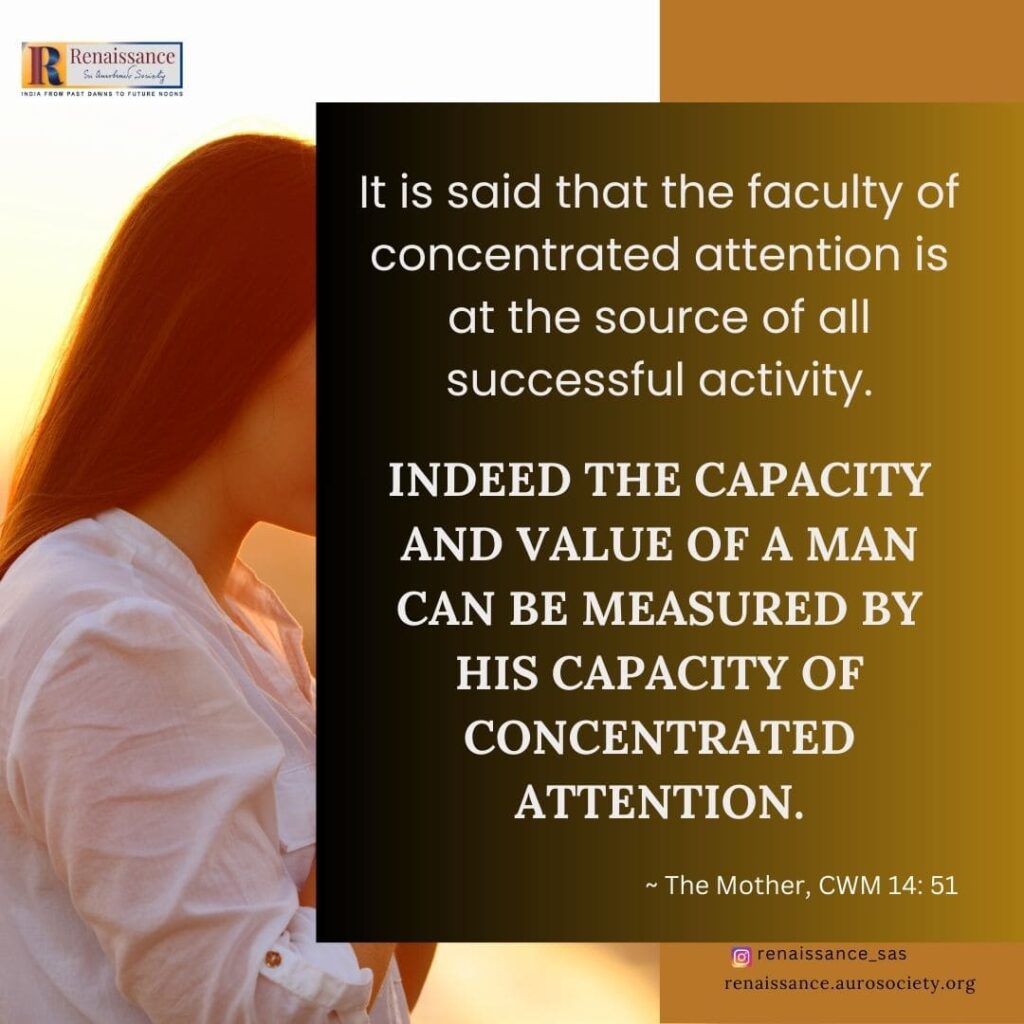
In this article, we will delve into the significance of focus and concentration. We shall explore the challenges that hinder our ability to concentrate. And we shall also discuss practical strategies for cultivating this invaluable skill.
Understanding Focus and Concentration
Though the terms focus and concentration are often used interchangeably, they encompass distinct facets of cognitive and psychological engagement.
Focus is essentially about discipline and, to some degree, willpower. It involves a conscious effort to concentrate on the task at hand, while ignoring distractions or other competing stimuli. Focus is often associated with a sense of clarity and purpose, as it allows individuals to prioritize their actions and make progress towards their objectives.
Concentration is how we direct our attention. It involves filtering out the noise and processing one of the multiple stimuli. When we concentrate on something, we are thinking intensely about it. Concentration is often associated with a sense of absorption or flow, where individuals become fully immersed in a task and lose track of time.
Concentration in light of Sri Aurobindo and the Mother
According to Sri Aurobindo, concentration is not just the act of focusing the mind on a particular object or task. It is a comprehensive process that involves the integration of all dimensions of the being. He speaks of concentration as a means to quiet the mind’s restless activity and attain a state of stillness where one can access deeper layers of consciousness.
He emphasises the purification of mind and emotions as a prerequisite for effective concentration. The process involves the gradual elimination of distractions, desires, and negative thought patterns that disrupt the mind’s ability to focus.
In Sri Aurobindo’s vast writings on concentration, we learn about the power of an exclusive concentration which can be helpful in specific areas. And we also about an all-embracing concentration that sets one central principle and then uses every incident and instance of life as an opportunity to focus the energies on that principle. As he reminds, “…it is an all-receiving concentration that is the very nature of the Integral Yoga.” (CWSA, Vol. 23, p. 78)
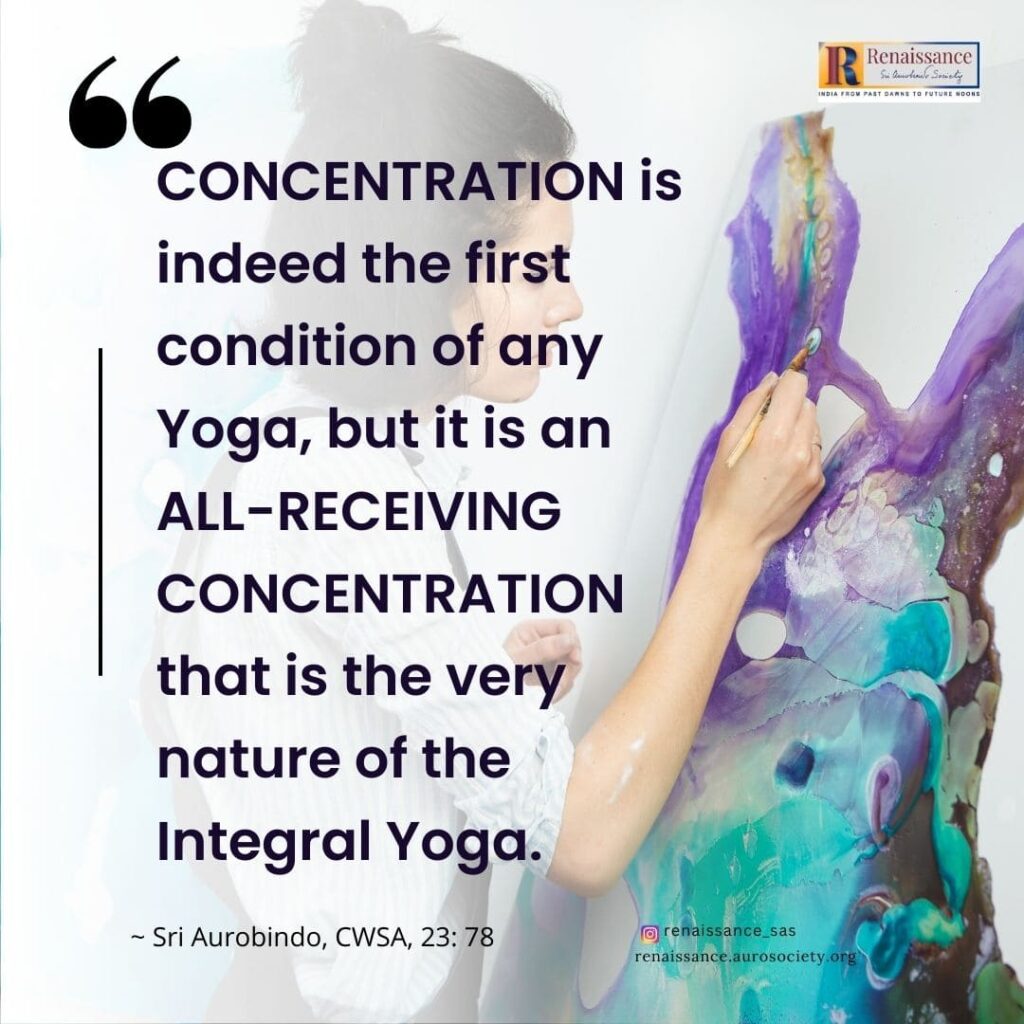
Inner Work of Concentration
Sri Aurobindo describes three successive steps or stages in the process of concentration.
- Fixing the consciousness in the heart and concentrating there on the idea, image or name of the Divine Mother, whichever comes easiest.
- A gradual and progressive quieting of the mind by this concentration in the heart
- An aspiration for the Mother’s presence in the heart and the control by her of mind, life and action.
The Mother helps us understand the significance of focused concentration when she says,
It is to bring back all the scattered threads of consciousness to a single point, a single idea. Those who can attain perfect attention succeed in everything they undertake; they will always make a rapid progress. And this kind of concentration can be developed exactly like the muscles; one may follow different systems, different methods of training.
~ The Mother, CWM, Vol. 4, p. 5
She says that often the easiest method that is generally recommended to obtain this concentration is to reduce one’s activities. This involves making a choice and confining oneself to this choice alone, so as not to disperse one’s energy and attention. She adds that in ordinary life, this method can be helpful and even indispensable. But for those pursuing a conscious inner life, a path of sadhana, more is required in terms of Yogic concentration.
In his lectures on Raja Yoga, Swami Vivekananda devotes considerable space to explain concentration. He describes the processes outlined by Patanjali, and how it can be intensified and focused as well as the kind of results one can obtain. He speaks of a systematic process of purification, quieting of the mind, control of one’s posture and breath, and eventually directing the concentration upon specific subjects or objects. As the concentration intensifies, it becomes more and more directed, and extraneous thoughts, feelings, and perceptions drop off.
READ:
Purpose Gives Focus; Concentration Gives the Ability
Challenges to Concentration in the Modern Age
While the benefits of focus and concentration are undeniable, several modern challenges hinder our capacity to engage in these practices effectively:
- Digital Distractions: The digital age has introduced a constant influx of distractions in the form of emails, instant messaging, social media, notifications, and more. These interruptions fragment our attention and make it difficult to stay focused on a single task.
- Information Overload: The vast amount of information available at our fingertips can overwhelm the mind. This makes it challenging to sift through and prioritize what truly matters. Infodemic is the new pandemic in today’s world.
- Multitasking Myth: Many people believe they can effectively multitask. But research has shown that dividing attention between tasks actually decreases overall efficiency and quality of work.
- Inner Restlessness: The constant stream of thoughts and internal chatter can hinder our ability to achieve inner silence, a prerequisite for deep concentration.
- Lack of Practice: In a world that values quick results, the patience required for prolonged focus and concentration is often lacking. Many individuals struggle to build the necessary mental stamina for sustained attention.
***

***
- Work Stress: Another important barrier to achieve concentration is work-related stress which arises from various pressures and demands in the professional environment. This can lead to a cascade of cognitive, emotional, and physical effects that directly impact concentration. According to one survey, 80% of employees reported feeling stressed at work sometimes and 60% of absenteeism was associated with stress in some ways.
When the mind is bombarded with multiple tasks, deadlines, and information to process, it is termed as “cognitive overload”. This can overwhelm the brain’s capacity to manage and organise thoughts, leading to scattered attention and reduced concentration.
Along with that, other work-related factors and working conditions e.g., increased demands on the job, effort-reward imbalance, job insecurity, lack of motivation and work-life balance contribute to a significant amount of reduction in attention and focus ability.
Practical Guidance from Sri Aurobindo and the Mother
Sri Aurobindo and the Mother provide several practical techniques to help us develop greater focus and enhance our concentration. Some of these are:
- Sitting in Silence: Both Sri Aurobindo and the Mother recommend starting the practice of concentration by sitting in silence, focusing the mind on a single thought, idea, or mantra. The process involves gently redirecting the mind’s wandering tendencies back to the chosen focal point.
- Progressive Relaxation: The Mother suggests a practice of progressive relaxation, where one consciously relaxes each part of the body, releasing physical tension. This relaxed state serves as a foundation for deeper concentration.
- Regular Practice: Consistency is key. It is important to keep a regular practice to develop the capacity for sustained concentration. We should also gradually extend the duration of our practice as our ability to focus improves.
- Invoking Higher Help: The Mother encourages aspirants to invoke the presence and guidance of higher spiritual forces during concentration. This invocation helps in aligning with divine energies that aid in the process.
- Combining Concentration with Devotion: Integrating devotion and love into concentration can enhance its effectiveness. Devotion adds an emotional dimension that deepens the connection and engages the heart.
- Awareness of the Breath: Focusing on the breath is a common technique in yogic practices. Observing the breath’s rhythm and flow can help in steadying the mind and achieving a state of concentration.
Mindfulness and Concentration
At the heart of focus and concentration lies the concept of mindfulness. When we focus our mind on a singular task, we are actively engaging with the present moment, free from distractions and divided attention. This process not only enhances our ability to accomplish tasks efficiently but also allows for a deeper exploration and understanding of the subject matter. Hence, mindfulness serves as a foundational practice for concentration. The ability to observe our thoughts and sensations non-judgmentally helps in recognizing distractions and redirecting our focus back to the chosen point.
It involves maintaining a moment-to-moment awareness of one’s thoughts, emotions, bodily sensations, and the surrounding environment without judgement or attachment. It is about being fully present and engaged in the current experience, whether it is a mundane task, a sensory perception, or a meditation practice. Mindfulness encourages one to observe the mental and emotional states with an attitude of curiosity and non-reactivity. Mindfulness training enhances our ability to control our attention. This is crucial for maintaining focus during concentration practices.
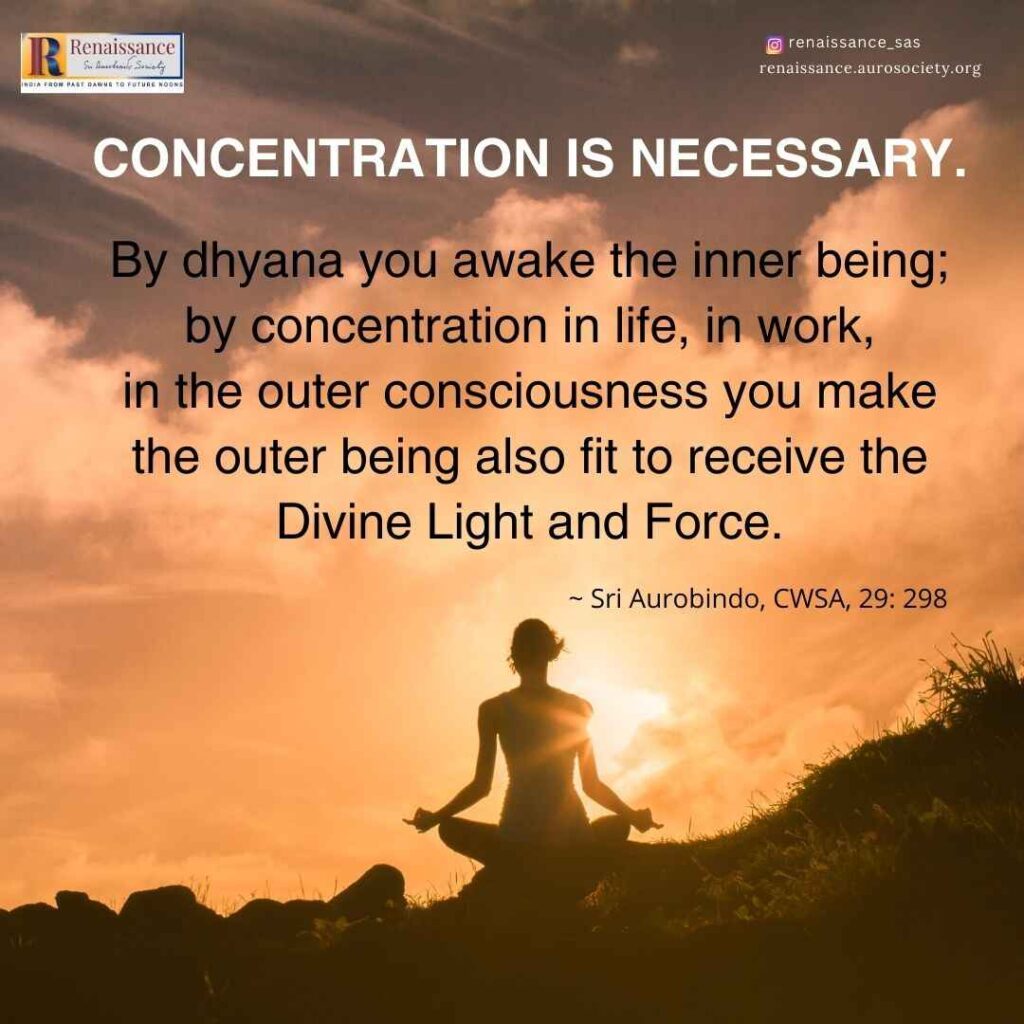
Holistic Benefits of Concentration
It is worth repeating here that concentration is not just limited to achieving an outcome related to our worldly goals. Its significance is much more in one’s pursuit of spiritual goals. All meditation practices, for example, require a certain degree of concentration. The objective of different meditation practices might differ, but they have “concentration” in common.
As we embark on the journey of enhancing our concentration and developing greater focus, we begin to unlock a myriad of benefits that extend beyond mere greater productivity. Some of these are:
- Enhanced Learning: Deep concentration leads to better retention and understanding of information, facilitating effective learning and skill acquisition. This is particularly important for students in current times.
- Heightened Creativity: Concentration fosters a state of flow, where innovative ideas emerge effortlessly. As the mind delves into deeper states of focus, it taps into the wellspring of creative insights, innovative ideas and produce novel solutions.
- Deeper Self-Exploration: Concentration provides a gateway to self-discovery and personal growth. Through focused introspection, we gain valuable insights into our thoughts, emotions, and aspirations.
- Stress Reduction: Concentration diverts the mind’s attention from worries and anxieties, promoting relaxation and reducing stress.
- Inner Peace: As we continuously cultivate the ability to quiet the mind and concentrate, we experience moments of inner peace and tranquillity. This state of calmness positively impacts our overall well-being.
- Connection to Higher Realms: In the teachings of Sri Aurobindo, concentration is a means to connect with higher states of consciousness. Deep concentration can lead to profound spiritual insights and experiences.
Concentration and Mental Health Issues
Concentration has a positive impact on mental health, particularly when dealing with various mental health challenges. While concentration itself may be affected by conditions like anxiety, depression, emotional trauma, ADHD or stress etc., practicing techniques to enhance concentration can contribute to improved mental well-being. I list below a few points on how concentration can be beneficial for individuals dealing with mental health issues and some strategies to cultivate it.
- Mindfulness Meditation: Engaging into mindfulness meditation enhances awareness of the present moment and cultivates focused attention. Regular mindfulness practice can improve our ability to stay present and reduce rumination.
- Deep Breathing Exercises: Deep breathing exercises help to calm the mind and enhance concentration. It reduces anxiety and creates a mental space for focused thinking.
- Progressive Muscle Relaxation: This technique involves sequentially tensing and relaxing different muscle groups. It can help release physical tension and create a more relaxed state of mind, conducive to concentration.
- Visualisation: Visualisation exercises involve picturing a specific image or scenario in one’s mind. This practice can enhance one’s ability to create mental images and improve imaginative thinking.
- Art and Creative Activities: Creative activities like writing, drawing, painting, or crafting require concentration and can be therapeutic, promoting self-expression and stress relief.
- Mindful Eating and Walking: Practising mindful eating and walking by fully engaging our senses help improve our ability to focus on the present moment and enhance the connection with our body.
- Yogasana and Tai Chi: Engaging in mindful movement practices like yogasana and Tai Chi can help improve concentration while also providing physical benefits and stress reduction.
- Digital Detox: It is most important to limit screen time and digital distractions to create space for focused activities. Disconnecting from technology can improve concentration and overall mental well-being.
- Professional Support: Finally, therapists and mental health professionals can provide tailored strategies to address the unique needs of each individual.
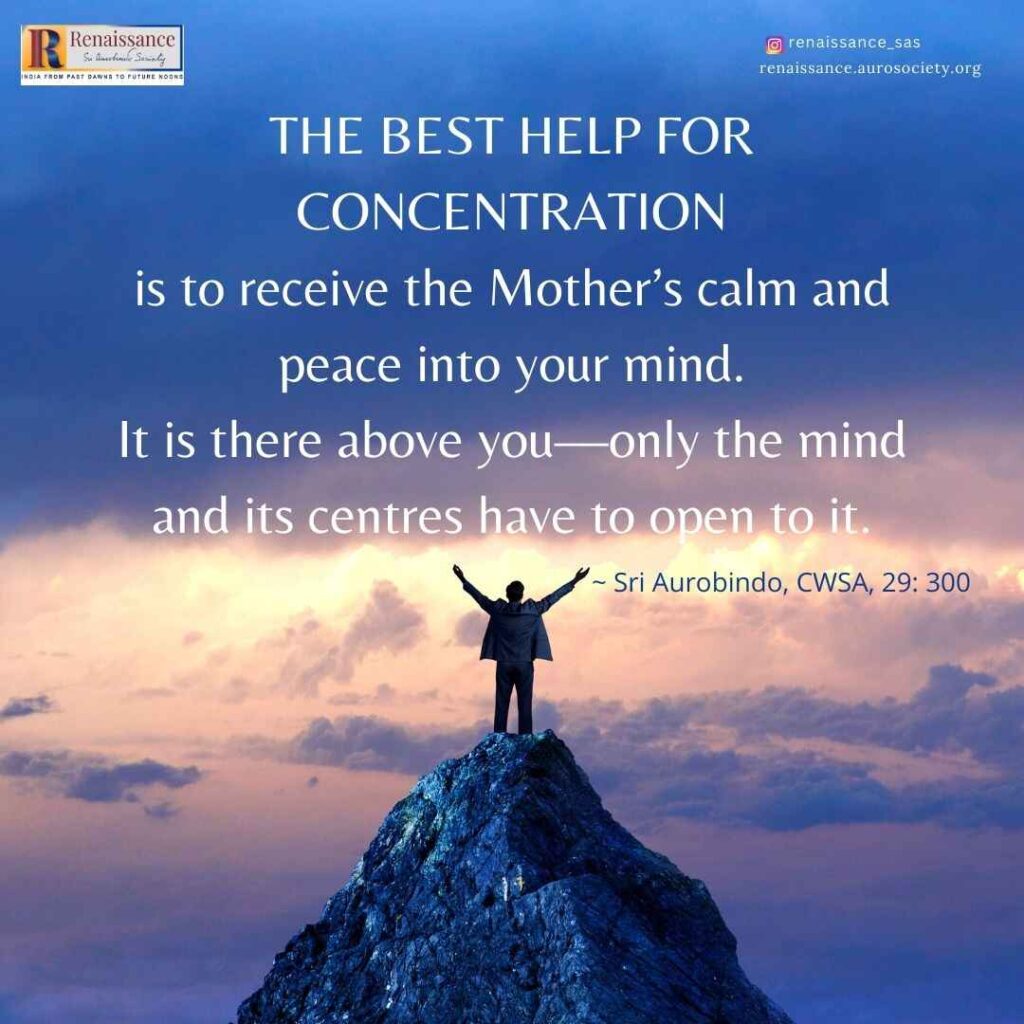
Transformational Potential of Concentration
In the teachings of Sri Aurobindo and the Mother, concentration is not merely a mental exercise; it is a path to self-mastery and gradual transformation. Their integral approach recognizes that the human being is a complex interplay of various levels of consciousness. And true concentration involves aligning and harmonizing these levels.
By embracing their teachings, individuals can journey beyond the surface of the mind and experience the depths of their inner being. Concentration becomes a gateway to higher states of awareness, self-discovery, and connection with the divine. It is a practice that leads to the integration of the mundane and the transcendent, allowing for the emergence of a new, awakened consciousness.
Sri Aurobindo and the Mother’s teachings on focus and concentration present a holistic and transformative approach to this essential skill. Their integral perspective acknowledges the interconnectedness of the human experience. It highlights the potential for spiritual growth through concentrated effort, aspiration, surrender, and alignment with higher forces.
As we strive to cultivate focus and concentration in our lives, we can draw inspiration from their wisdom and practices, allowing us to journey inward and discover the profound depths of our own consciousness. Through their teachings, we learn that true concentration is not just a mental exercise, but a profound journey of self-discovery and connection with the infinite.

~ Design: Beloo Mehra

